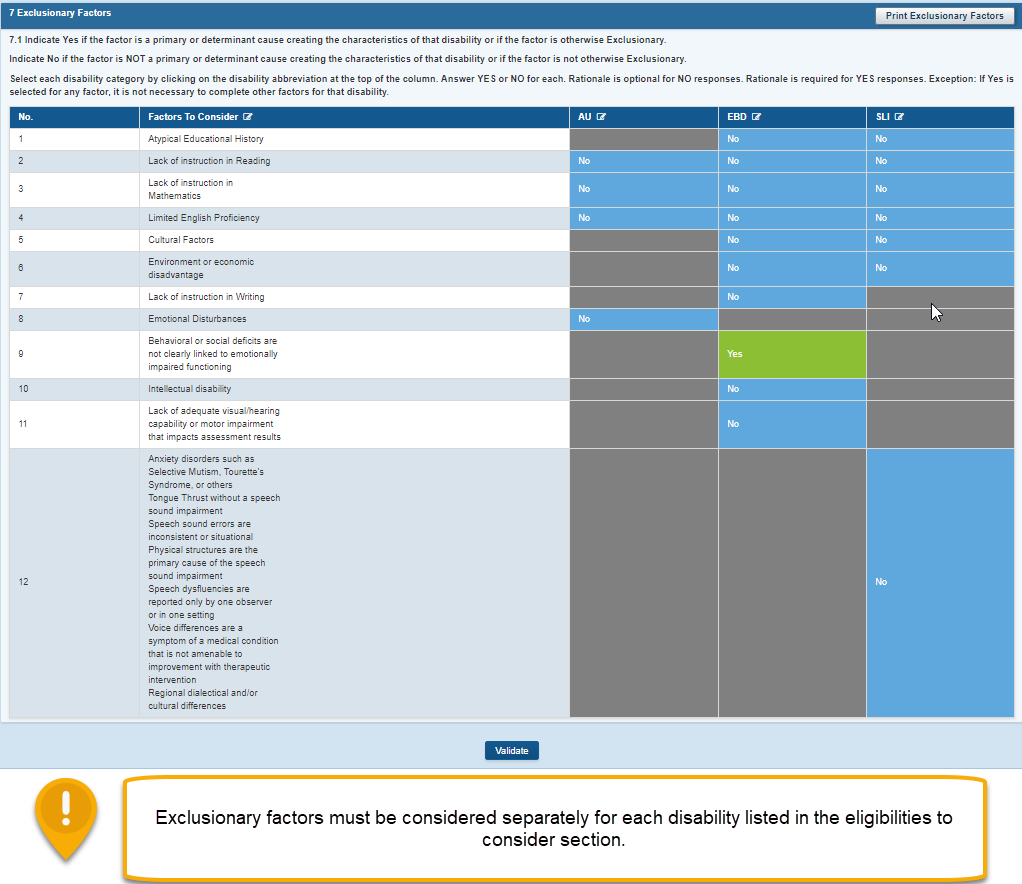7. Exclusionary Factors
There are many exclusionary factors that must be considered for each disability. GO-IEP asks for the appropriate exclusionary factors to be examined for each eligibility category the committee is considering. A factor may be exclusionary for one disability, and not exclusionary for another disability. An explanation grounded in the available data must be included as documentation. Prior to completing additional sections of the eligibility form, the committee must analyze the available data to determine if the student has issues that have not been resolved through general education supports. It is critical that the committee determine if there are issues that have not been previously resolved. Classifying a student as a student with a disability is a decision that impacts a student for life. Any decisions made by a committee must be certain that all available supports have been provided to the student prior to determining disability.
Committee members must consider whether each factor is a primary or determinant factor creating the characteristics of the disability in question. If the exclusionary factor is determined to be a significant cause of the characteristics of the disability, then the student SHOULD NOT be found to be eligible for that disability. For any factor, the answer may vary by disability.

Answer "Yes" or "No" for each factor for each disability.
Rationale must be provided for each YES response.
When you select YES, the factor listed is a significant or determinant cause of the characteristics of the disability, enter a specific comment providing relevant information. The student will not be eligible for that disability category and it will be excluded by GO-IEP.
If the item listed is not considered to be the primary cause or a determinant factor related to the characteristics of that disability, select NO. A rationale statement is not required when NO is selected.
The exclusionary factors should have been discussed at length during the SST (Tier 3) process on whether the factor had an impact on the student’s educational progress. Exclusionary factors must be considered in eligibility determinations. Each factor should be considered for its impact or lack of impact on educational progress and whether or not this factor is considered to be a primary cause or a determinant factor related to the characteristics of the disability being considered. Prior to making a final eligibility decision, the committee must analyze the available data to determine if the student has issues that have not been resolved through general education supports. It is critical that the committee determine if there are issues that have not been previously resolved. Classifying a student as a student with a disability is a decision that impacts a student for life. All available supports must have been provided to the student prior to determining he/she has a disability.
Once the factors have been addressed, the team needs to refer to the responses and refer to the eligibility criteria for each disability category.
Examples of exclusionary factors:
Lack of appropriate instruction in reading, math and written expression: Did the student have access to quality instruction, interventions and research-based curricula?
Limited English Proficiency: It is very important to include an English Speakers of Other Languages (ESOL) staff member who is familiar with the student suspected of having a disability. It will be necessary to include a language profile for this student that specifically investigates the language proficiency in both the primary language and English. Even if the student is EL, only select "Yes" if the committee members feel the EL needs are creating characteristics that resemble a given disability.
Cultural Factors: A student's culture should not be a determinant factor of a disability. An important method of obtaining pertinent cultural information is by interviewing key family members. All results obtained must be interpreted in relation to the student's dominant cultural influences. Even if the student has cultural factors, only select "Yes" if the committee members feel the cultural factors are creating characteristics that resemble a given disability.
Environmental or economic disadvantage: A student's environment or economic disadvantage should not be a determinant factor for determination of a disability. The committee will need to thoroughly examine family stressors that may be impacting educational progress to include homelessness, unemployment, extended illnesses, death in the family, divorce, pre-school experiences, lack of books in the home or expectations of the family for the student. Even if the student has environmental or economic disadvantage, only select "Yes" if the committee members feel the environmental or economic disadvantage are creating characteristics that resemble a given disability.
Atypical educational history: The team must discuss if the student has high levels of mobility and/or absenteeism which may have influenced the educational progress of the student. Even if the student has Atypical educational history, only select "Yes" if the committee members feel the Atypical education history is creating characteristics that resemble a given disability. (NOTE: Users can easily switch from GO-IEP to SLDS to view enrollment and attendance history for information to assist with this decision.)
Visual, hearing or motor disability: The committee will need to analyze information in order to rule these out as source of difficulty when determining specific disabilities. Even if the student has visual, hearing or motor disability only select "Yes" if the committee members feel the visual, hearing or motor disability is creating characteristics that resemble a given disability.
Mutism, tongue thrust and dialectic: Mutism, tongue thrust behavior without associated speech sound impairment, or dialectic differences cannot be the primary or determinant cause of a speech language disorder. The committee will need to analyze information in order to rule out as source of difficulty when determining specific disabilities. Even if the student has mutism, tongue thrust or dialectic differences only select "Yes" if the committee members feel the mutism, tongue thrust or dialectic differences is creating characteristics that resemble a given disability.